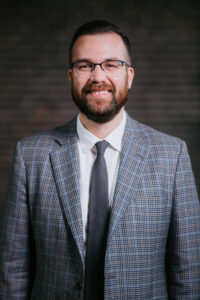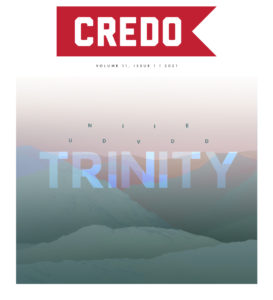In every age each generation is tempted to forfeit a key component of trinitarian orthodoxy. In our age, we have shown ourselves all too willing to compromise trinitarian simplicity. With the rise of social trinitarianism, the persons have become their own individuals with their own centers of consciousness and will, inviting the charge of tritheism. Couple this with the simultaneous rise of EFS (eternal functional subordination), and these persons are no longer equal in authority and glory due to hierarchy within the inner life of the Godhead. Long gone are the days when Christians could say with the Athanasian Creed,
the Father is almighty, the Son almighty
and the Holy Spirit almighty,
and yet they are not three Almighties
but one Almighty.
To make matters worse, too many today speak of trinitarian unity in the economy of salvation as if it is nothing more than a cooperation between different agents or even a division of labor, segregating the persons one from another. Some even say that the persons can act solo, as if the Father for example can work independently of the Son and the Spirit. Inseparable operations—the orthodox conviction that the external works of the Trinity are undivided because the persons themselves are indivisible in essence—is not only foreign to many but outright rejected as well. Nothing demonstrates Trinity drift like jettisoning an essential ingredient to biblical and Nicene orthodoxy.
For these reasons, my new book, Simply Trinity: The Unmanipulated Father, Son, and Spirit (Baker) labors to reintroduce Christians to doctrines like divine simplicity and inseparable operations. But rather than succumbing to the biblicist virus, I take a more organic approach. I put the reader in the sandals of a Zipporah, a fictional first century Hebrew woman deeply committed to the shema. Zipporah, without warning, is thrust into the volatile ministry of Jesus, forced to wrestle with the Messiah’s claim to be one with the Father. I begin many chapters in Simply Trinity from the perspective of Zipporah as she witnesses the fierce debates between Jesus and the religious leaders. What follows is an excerpt from her story (based on John 10), a story that might just help the church today recover the unity of the Godhead so that we can confess once more, “we worship one God in Trinity, and Trinity in Unity”.
Yesterday I walked all the way to temple. I made the journey to prove myself: my sister didn’t think I could still do it. Not at our age anyway. When we were young, the two of us walked to temple at least three times a week. I remember those trips: we used to skip hand-in-hand across the purple ocean of hyacinth squills in the spring. Halfway, we’d lie down under an olive grove to escape the heat, shaded by those ancient arms, fed by their single offering: brown and black olives, some bitter, some sweet. Popping olives into our mouths two at a time, we’d laugh at each other’s confident predictions. How certain we were that any day now a handsome young man from Jerusalem would travel so far as our little town just to ask our father for our hand in marriage.
That was a long time ago, and while no handsome suitors ever arrived, my sister and I have remained constant companions. But we don’t always see eye to eye. It wasn’t the distance that bothered her, but the precarious tension within Jerusalem made her feel uncertain when I told her I was on my way to temple that morning. She’s my older sister, so I suppose she feels responsible for me, but I’ve told her many times now that I can take care of myself.
But I knew she was on to something. For when I sat down to rest my ankles, which were now blistering from the rough edges of my leather sandal straps, that man Jesus walked by, and a crowd of disciples followed behind, like ducks all headed to the same pond. Worry swept over me like a tall wave in the sea. Every time I cross paths with Jesus something happens—a miracle or a fight with the Jews, but usually both. My feet were still screaming for relief, but I put my sandals back on and limped my way into the temple, curious to see what Jesus was up to. I didn’t get far before I was pushed aside by the religious leaders, a pack of wolves ready to pounce with their sharp, skeptical questions meant only to trap the rabbi.
“How long will you keep us in suspense? If you are the Christ, tell us plainly,” they demanded.
But they were anything but sincere. In my experience, no matter what Jesus says or does, they will not believe him. They’re not open to believing him. They have been eyewitnesses to some of Jesus’s most impressive miracles, but they hate him all the more for these supernatural feats; they want him dead. That was the motive behind their question, a question as fatal as it was fierce. I knew it. The crowd knew it. Still, the question had face value to those listening, to those who came without an agenda. Heads turned with all eyes on Jesus, waiting to see how he would respond now that he was being put on the spot.
“I told you, and you do not believe. The works that I do in my Father’s name bear witness about me, but you do not believe because you are not among my sheep.”
I looked around, trying to judge the reaction of the crowd, Israelites no doubt familiar with their Shema. Judging by the furrowed brows, Jesus’s response was a shock.
“Is he claiming that he is not on his own, that he has come from his Father, that his miracles are all done in the name of his Father, that he is none other than the Father’s Son and Messiah?” the man next to me asked.
But Jesus continued, this time with words that took aim at their identity, the identity of his critics: “You are not among my sheep,” he told them. “My sheep hear my voice, and I know them, and they follow me. I give them eternal life, and they will never perish, and no one will snatch them out of my hand.”
Hearing such a conclusive verdict, I looked around and could tell what they were thinking by the look on their faces: How do you know this? As if he knew what they were thinking, Jesus fired back and said, “My Father, who has given them to me, is greater than all, and no one is able to snatch them out of the Father’s hand.”
“How does he know this?” the woman to my left said in a low voice, not wanting anyone to hear.
“Haven’t you been listening?” I whispered back. “He is the Son, the one to whom his Father has given these sheep.”
“But didn’t Jesus just say these sheep were in his hand? Now he says they are in his Father’s hand. So, which is it?” she replied.
“Both,” I said.
Then Jesus said something that took everyone by surprise: “I and the Father are one.” Even his own followers were taken off guard by the blunt blow of those words.
After what seemed like an eternity of reticence, the religious leaders let out an audible, disgruntled groan, shaking their heads, some holding out their hands and looking around, expecting everyone else to share their disbelief.
“What is he saying?” the woman next to me asked again, now more confused than before, but this time in a quieter voice, seeing the tension between the religious leaders and Jesus escalating.
“I don’t think Jesus is merely referring to the way he, the Son of God, cooperates with the plan of his Father, a plan to save his sheep,” I tried to clarify. “Jesus doesn’t mean anything less, but I think he means much, much more.”
Was I right? Or was I reading too much into Jesus’s words? What happened next revealed the answer: the Jews picked up stones from the ground, jagged and sharp enough to really hurt someone, even kill someone. The crowd started to panic when they realized that someone was Jesus. Stoning was a penalty for serious blasphemers, the type who claim that they are Israel’s Messiah or God himself, or both. Just the thought of a stoning shot anxiety up and down my spine like a cold chill. This was why only last week my mother told me to stop following Jesus; she was worried I might get hurt just being near the man. Perhaps she was right. But now was not the time to stop. I was already in the thick of it.
As I watched them take aim at Jesus, everything clicked all at once: Jesus was claiming something significant, something divine even. He was claiming an eternal identity, and his claim was so strong, so absolute, so radical, that he believed he was one with the Father himself. I must have been thinking out loud, for the woman next to me elbowed me in the ribs, as if to say, “Shut up!”
I looked back up at Jesus, then at the Jews, then at Jesus again. He was a dead man. But just when the first stone was about to launch, Jesus spoke up. “I have shown you many good works from the Father; for which of them are you going to stone me?”
The question was provocative, forcing the Jews to tell him who they think he is. And, to my surprise, they took the bait. “It is not for a good work that we are going to stone you but for blasphemy, because you, being a man, make yourself God.”
I knew it: the Jews did understand Jesus’s claim to be as radical as I thought.
“If I am not doing the works of my Father, then do not believe me; but if I do them, even though you do not believe me, believe the works, that you may know and understand that the Father is in me and I am in the Father.”
This second response intensified an already dire situation. Jesus could not have made a more direct claim to oneness with God. No Jew would have dared to claim such a thing, nor would even the greatest of Israel’s prophets. But maybe, just maybe Jesus was something more.
The dispute went on for what seemed like the better part of half an hour until the Jews stopped debating and sought to arrest Jesus instead. Somehow, though I’m not sure how, Jesus escaped. Last thing I heard, he made his way across the Jordan and received a much better reception when he landed on the other side. I’ve thought about making the trip myself if my feet could endure it. But I’m afraid I’ve inherited my father’s soft soles.


